Young Harlem on His Shit Again
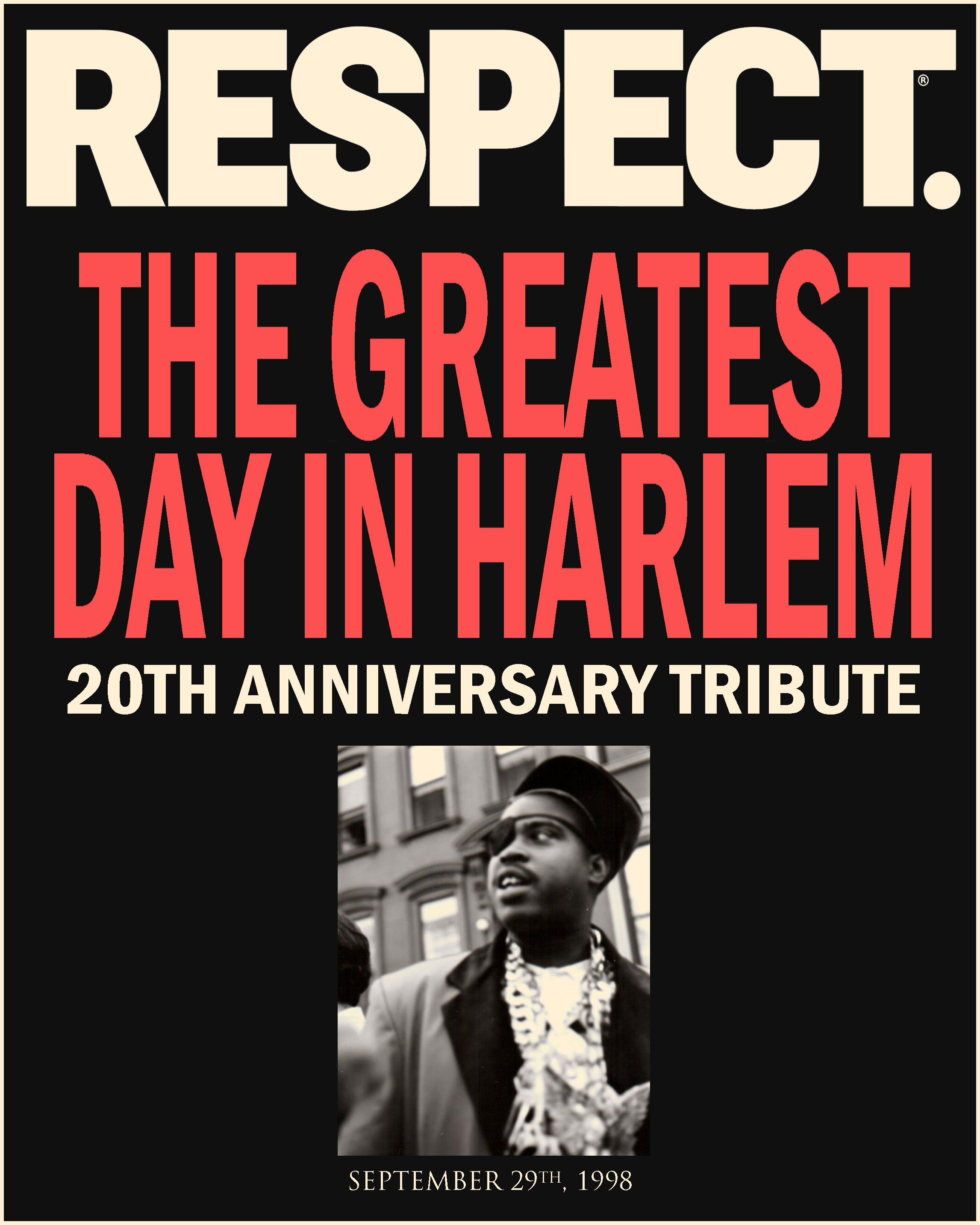
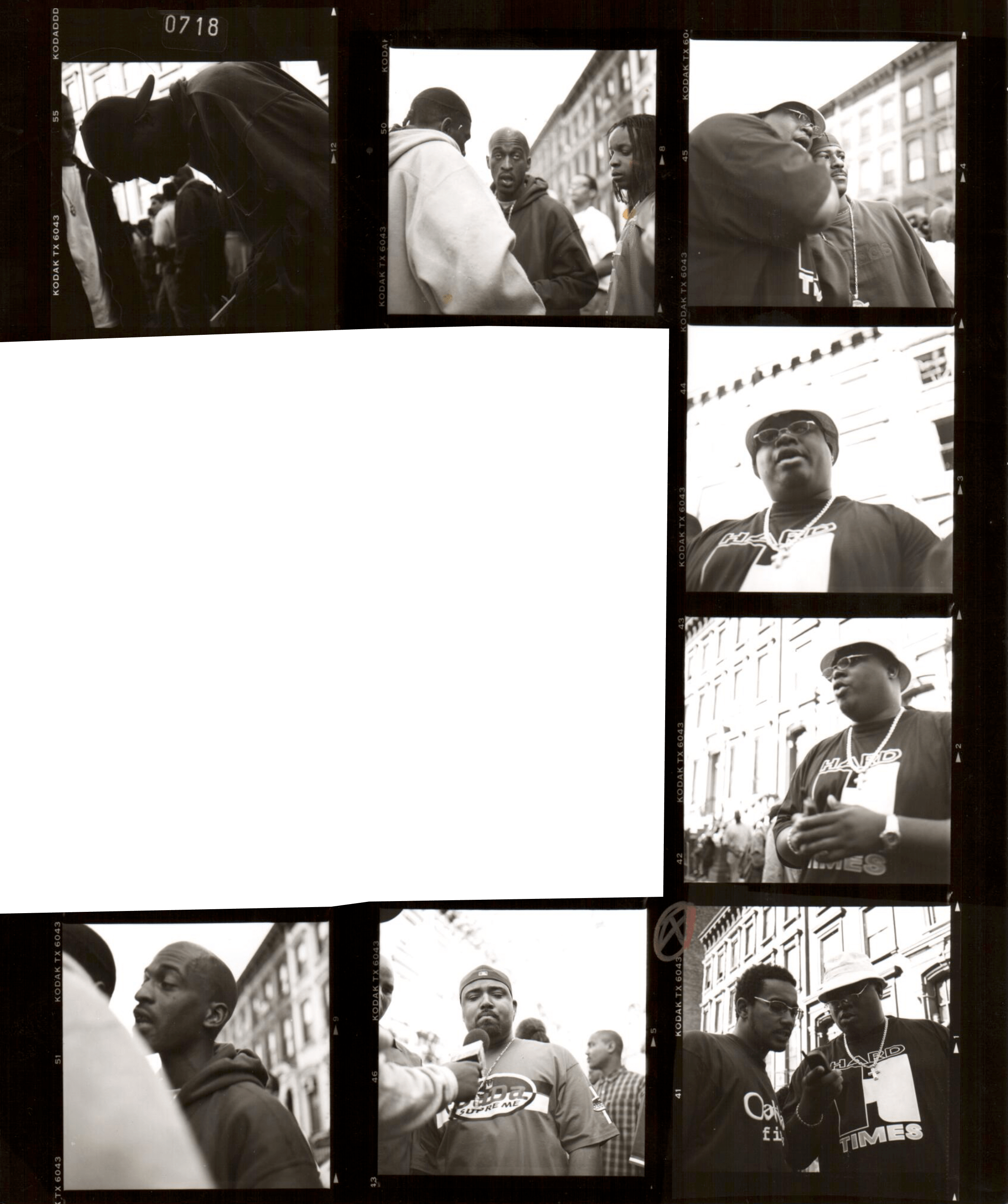

Who'd veto that? I remember thinking immediately subsequently someone in that fateful XXL meeting brought upwardly a cover concept supposedly shot downwardly before my arrival. A remake of Art Kane's iconic Jazz Portrait, one of the most renowned photographs in music and magazine history, reshot on its original site? That seemed too fantastic — and frankly, too feasible — an thought for the smart brothers who preceded me to turn down.
Maybe my years every bit editor-in-chief of Rap Pages had inured me to the idea of an impossible cover. Hard? Sure. Incommunicable? Nope. At that place was nary a encompass concept, no affair how odd or unlikely, that Rap Pages' wildly imaginative edit squad couldn't somehow massage into viability, then, ultimately, reality. We snuck onto authorities land to shoot Goodie Mob immersed in a chilly swimming where snakes swam almost as freely as fish. Nosotros talked Lauryn Loma into beingness slathered in sky blue body paint from her ears to her ankles. We even persuaded a lovely young model named Shonda Santiago to allow Ol' Dirty Bastard cup her bare breasts to playfully kick Rolling Stone'southward infamous 1994 Janet Jackson cover in its shins. Gathering as many hip-hop artists we could on the same Harlem stoop dearest jazz visionaries like Count Basie, Dizzy Gillespie, Thelonious Monk, Charles Mingus, Art Blakey and their ingenious ilk once famously posed for Esquire? Hell, what was so hard virtually that? Granted, recreating Kane's seminal image wouldn't be easy. Simply, so what?
If at that place was ever a artistic crew outside the Rap Pages squad that could practise it, this was the one. Larry "The Blackspot" Hester had left Vibe with me to run XXL as the consummate lieutenant to my captain; nosotros were clearly on a mission to tread some new and exciting territory. Everyone was. The skeletal staff at SLAM, Harris Publications' wonderfully raw basketball mag, had become its hip-hop cousin's editorial girders by default after its original leaders' difference: the wise and wily Tony Gervino, shit-talker extraordinaire Scoop Jackson, razor-witted Russ Bengston, mercurial pattern man Don Morris, borderline regulator Anna Gebbie and Ben Osborne, the young Wonder Twin opposite XXL'southward zealous Datwon Thomas, the 2 our pack's hungry, playful cubs, eager to larn and mature at their protective elders' sides.
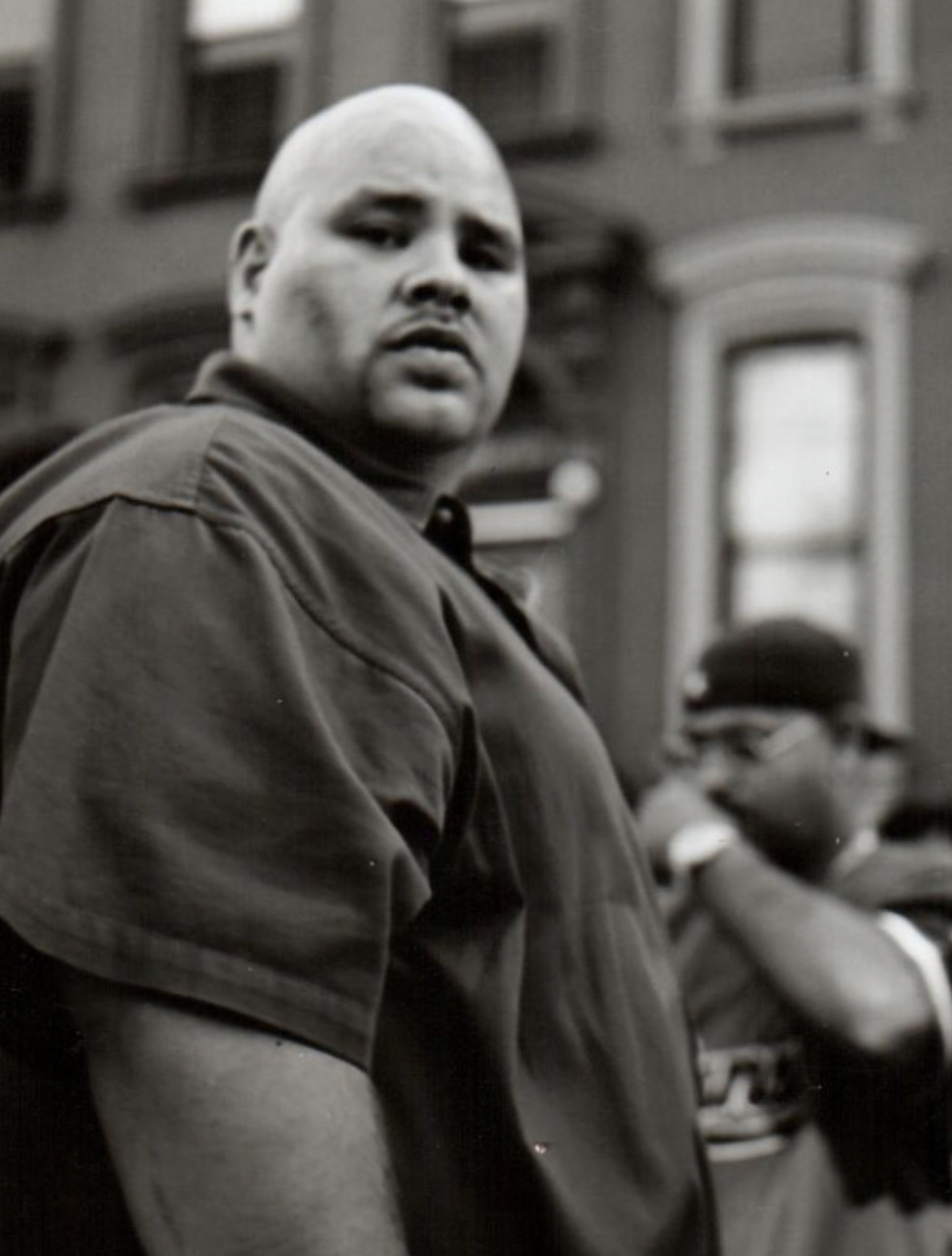

Information technology was spring of 1998, and XXL's inner circle found itself literally seated in one — no table betwixt us, just notepads on laps and pens in hands. But similar at Rap Pages, XXL editorial meetings were, to me, always every week'due south highlight. They, too, were exercises in productive appointment, used to not only program and status-bank check details of pending issues, but as well connect and bond over the music and civilisation nosotros were immersed in and inspired by. Open up, honest dialogue was encouraged and expected, and positions didn't matter a flake; interns' opinions were given equal weight equally those of their titled supervisors. Spotting a skeptical lip curl or countenance heighten from a junior staffer was always a care for for me at these sessions, equally convener, since those tell-tale giveaways were cinch opportunities to coax out a contrary viewpoint that'd inform or deepen our discussions, often both. Over time, as those players' confidence bulked up, the need to cajole out their insights disappeared, making for even richer in-the-huddle interchange.
And then, here we were, talking about upcoming features to consider and highly-anticipated albums for summer and autumn. One time the subject of recreating the Fine art Kane photo interrupted the agenda, all else hit the back burner.
But, surprisingly, this brilliant bunch needed to be convinced nosotros could brand information technology happen.
"Why not? What's stopping us?" I shrugged in response, genuinely taken aback at their reluctance. "It's non like Harlem is Mars; it'southward a couple miles up the street! Why tin't we do information technology? Y'all are actually going to accept to explain it to me. Why can't nosotros practice information technology?"
Asked aloud, something about the question'due south fundamental simplicity must've started to shake the squad's doubtfulness from its foundation, indicated past the shift in their body language. Facial expressions morphed from outright atheism to hopeful contemplation. Crossed arms loosened into slow shrugs of consideration. Optics peered skyward as whirring prospects spun behind them like pinwheels, sly smiles widening out underneath. A barrage of queries and comments erupted: "How would we decide who should be there?" "The original moving picture was taken when?" "It'd be an instant collector's detail, wouldn't it?" "Could we bring in people to aid?" "What if only East Coast artists evidence up?" Having knocked the concept into the realm of possibility, nosotros kicked information technology around amongst united states of america for a while. Thankfully, it didn't have much effort to sway them. By the fourth dimension we finished, their stubborn reservations had vanished — or, at the very least, been outsized by some eagerly-won finality.
Our meeting ended on a high, the fundamental vision firm, however morphing with every impromptu conversation and brainstorm peak betwixt us over the next couple of weeks.
Once we discovered it was Jazz Portrait'due south 40th-ceremony twelvemonth, the die was cast, just instead of planning the shoot for a random month'southward cover, it was slotted for yr-cease. As expected, Dennis Page, the magazine's publisher, was an easy sell, even on hiring an outside firm to manage the whole matter. A Trenton, NJ guy with a dear of black music deeper than well water, Dennis was no stranger to Kane's photo or its significance. He loved everything most the recreation idea from the door, even when originally proposed past executive publisher Jonathan Rheingold, at the proffer of his wife, Pamela, every bit XXL's launch embrace paradigm. But Dennis was the human belongings its wallet, so he knew, more than the residue of us, the crucial need to position ours — branded "Hip-hop on a college level" — as a stand-out from all the other urban 'zines on newsstands. The timing, he'd surmised, had to be right. Vii issues in, it was.
We sketched out a crude framework from which to launch: An open phone call for every artist or figure — old schoolhouse and new, indie soldiers and major-label chart-dwellers akin — who'd made an unquestionably noteworthy impact on hip-hop music and its progress or had ever recorded a rap album. That spared us the drama and trauma of having to comb through a miles-long roster of deserving DJs, b-boys, b-girls and graf writers across the country who'd made immeasurable contributions to hip-hop; we'd stick to those who fabricated records. Naturally, we'd enquire the inventors and originators to be there, but we'd hit every signed act nosotros could reach, besides, hoping that if they were familiar with Kane'due south famous Esquire photo — or their publicist was — and believed information technology worthy of a hip-hop remix, they'd get the concept, go themselves to the shoot site, and get on XXL's cover. We simply needed 57 people to lucifer the number of jazz masters in Kane's image, so if even a smidgen of those we invited showed up, that'd exist a feat.
Now, who to help usa pull information technology off? Had to exist someone who'd know the artists to target and how to attain them without any handholding from an already borderline-dazed staff. I gave Dennis the contact info for Lesley Pitts, the tearing, widely-adored publicist who'd been a strength of nature at Gear up to Run, Leyla Turkkan's standard-setting PR house and hotbed of black-music publicity talent, then served as Jive Records' vice president of publicity earlier finally stepping out and starting her own company, No Screaming Media. Lesley's collaborator would exist the equally formidable Biff Warren, a veteran publicist I'd met years prior during his stint at Pallas Records. He'd handled press for a mix of underground rap grimies and A-listing R&B phonies for years, so Biff had the trust of cats on Brooklyn's back streets and in lush loftier-rise suites. Their combined apprehending guaranteed that our ambitious projection would be in capable hands. Plus, as an added bonus, whatsoever time spent toiling aside these 2 was simply as sure to be a hoot, even among the stress.
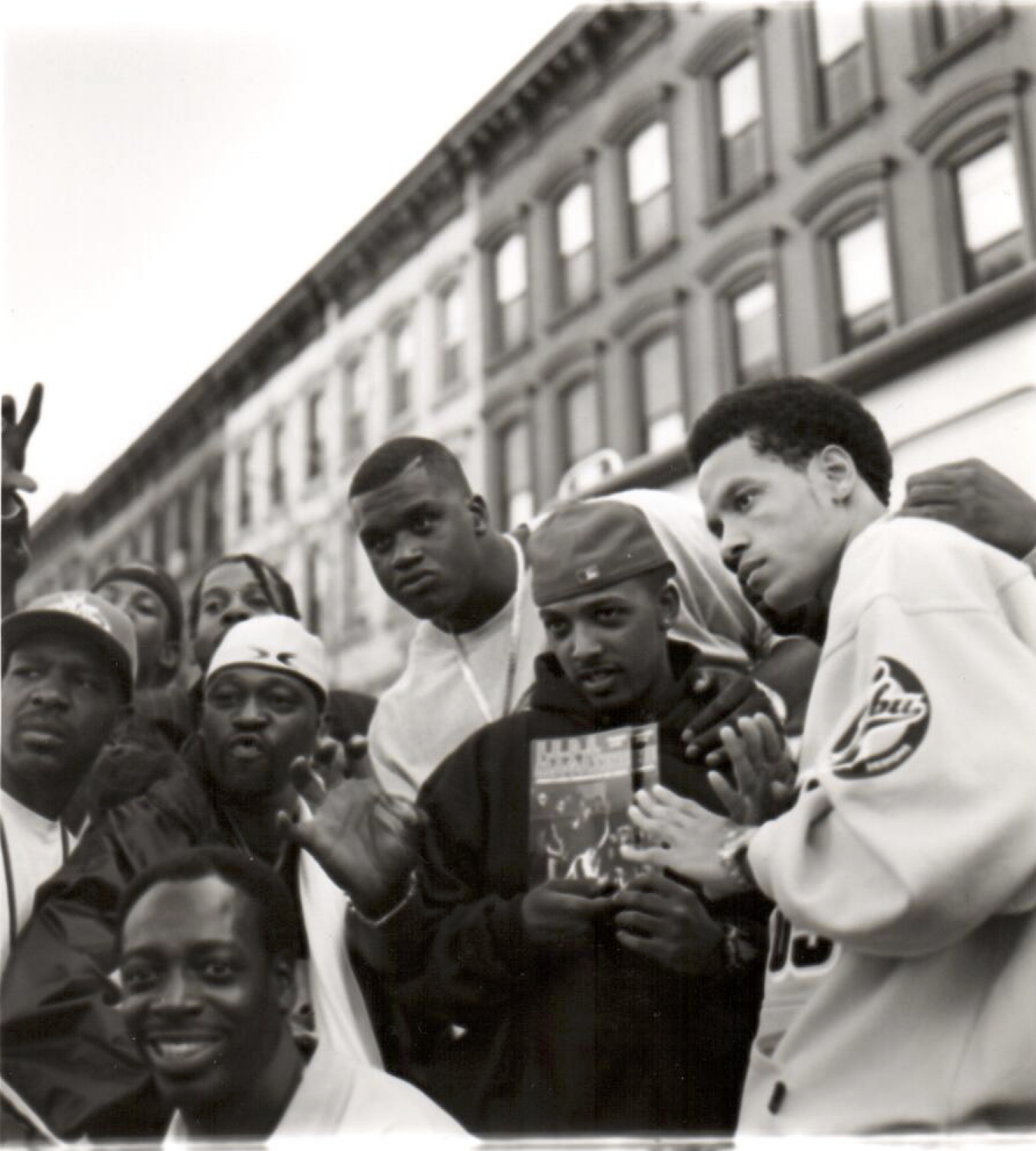
Once contracted and officially on the clock, Lesley, Biff and I took the half dozen train uptown to further telescopic out the block of 126th Street, between Madison and Fifth avenues. A handful of u.s. from XXL had already swung past the site address — 17 E. 126th Street — and then we three went in search of the closest nearby church building that could act as our outpost, a place with a decent-sized community space where the invitees could mail up before and afterward with some catered food, probably from the nearby Sylvia's. Every bit luck would take it, the massive Metropolitan Community Methodist Church building sabbatum right on the northeast corner of 126th and Madison, where a sweet woman named Denise Pickett greeted u.s.a. with warm hugs. She permit us tour their huge, second-floor multi-purpose room and made arrangements for Les and Biff to connect with its pastor to talk specifics. As we were leaving, talk turned to security, and it was unanimously agreed, perhaps even suggested in unison: The Nation of Islam. Boom.
Lesley's call a few days later flipped our entire script. She had a proffer from her longtime dearest, author Michael Gonzales, a close personal pal and professional favorite of mine since the Rap Pages days.
"You know who we should get to shoot the cover?" she gushed excitedly when I answered — no greeting, zippo.
"Who, daughter?" We'd been contemplating some candidates, mainly photographers who'd already shot covers for usa. Tragically, Kane himself, who was among our initial-begin considerations, had committed suicide in 1995.
"Gordon Parks."
Gasp. Of course.
Gordon Roger Alexander Buchanan Parks. The groundbreaking Life magazine photojournalist. The founding editorial director of Essence. The filmmaking pioneer who brought charismatic-PI badass John Shaft to silver-screen life, carving an unabashed black-swagger bas-relief onto the world's cinematic consciousness while simultaneously saving a borderline-bankrupt Hollywood studio. Plus, so much of Parks' own story mirrored the culture itself. Like hip-hop, very few corners in blackness America hadn't been somehow touched or shaped past his adventurous brilliance. Like hip-hop, he was the ultimate insider to Life's mainly-white audience, his images serving as windows into worlds and secrets kept hidden non by deliberate concealment or force, but past apathy and disinterest. He, too, was passionate, complicated, principled, flawed. And his wondrous galleries told tales of brutality and beauty with the same detail and nuance as hip-hop's starkest, most enigmatic verses.
Even better: Parks had a rich, of import history in Harlem, sealed by the moments he captured there. His close, storied friendship with Malcolm X began uptown later on he followed the and so-NOI spokesman from 125th Street and Seventh Avenue to a Muslim eating house on Lenox; the fiery orator had just effectively dressed downwards a group of white NYPD officers standing on the periphery of a crowd of black Harlemites enthralled by his eloquence. Parks was still existence lauded some five decades after he pointed his camera at Red Jackson, the handsome, charismatic subject of 1948's Harlem Gang Leader, the centerpiece of his debut photo essay for Life. Twenty years later, Parks put its readers face to face with uptown's violent poverty via the haunting, revelatory A Harlem Family and his weeks living with perpetually jobless, oft abusive alcoholic Norman Fontenelle, Norman's beleaguered married woman, Bessie, and the youngest of their viii children. His sharp, detailed examinations of heartbreak and exhaustion poignantly illustrated the strength and humanity of America'south put-upon black step-children with a depth and grace unseen before or since.
With his fabled eye behind the lens, XXL'due south cover shoot would upshot in so much more than than any of u.s. envisioned. We'd no longer but be remaking a classic movie to cap off our best-of-1998 coverage. This photograph would get an antiquity in its all-time, most accurate sense, a masterwork that would bring together the universally-celebrated catechism of one of the nation'southward true cultural giants.
Gordon Parks. He was better than perfect. He was a game changer.
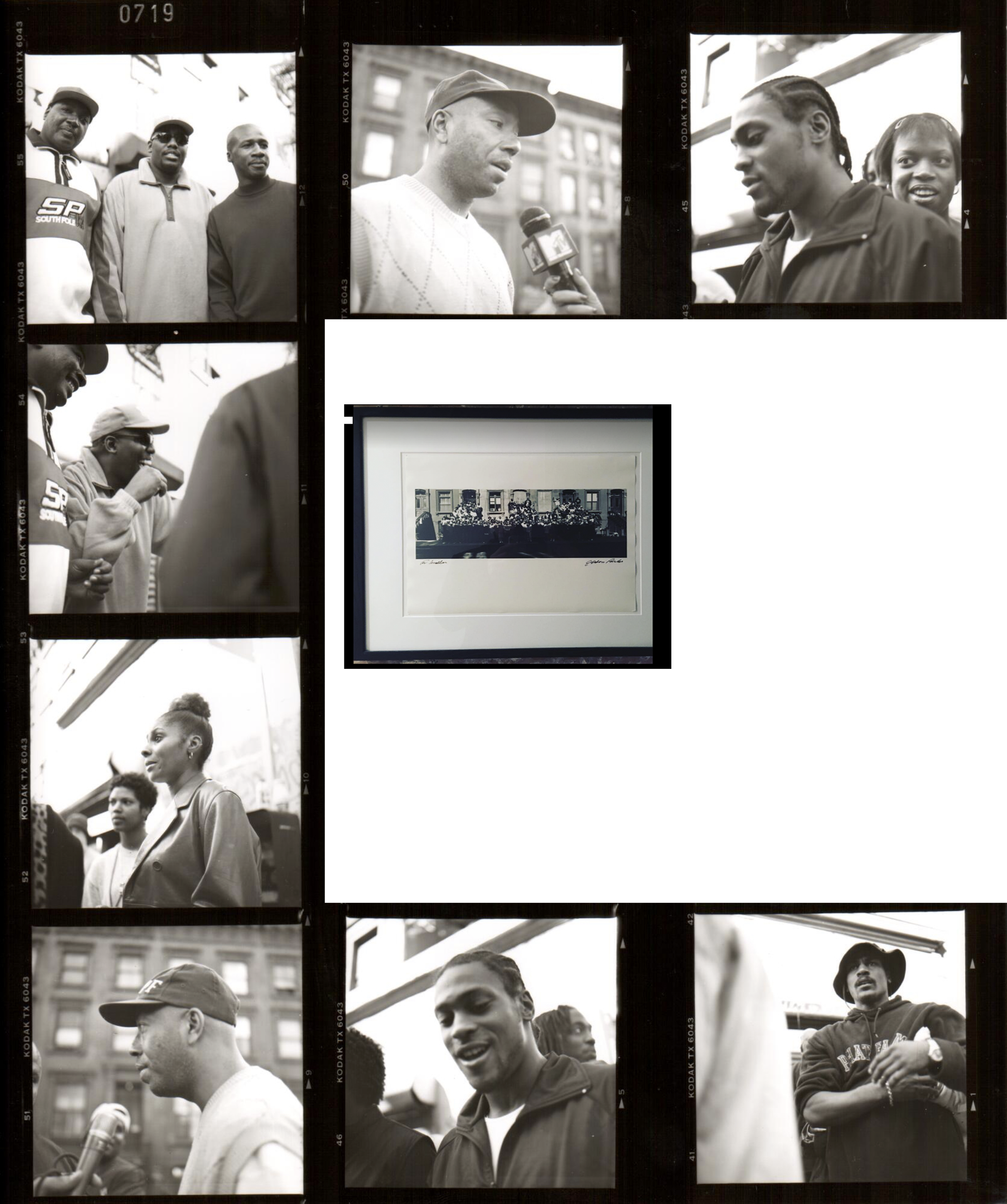
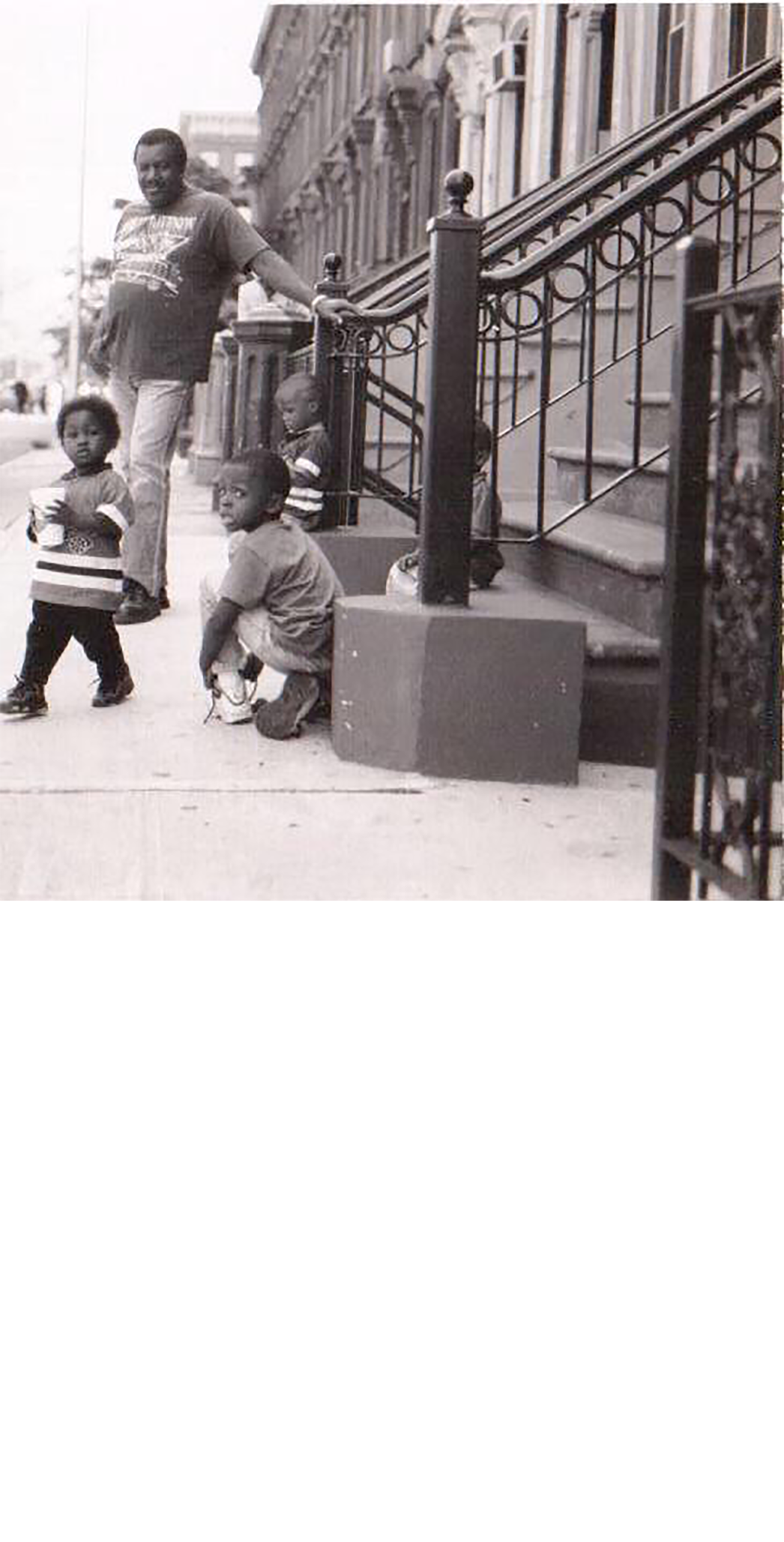

"Oh, my god, Lesley! Are you kidding me?" I replied hysterically afterwards the mental backflips stopped. "That is fucking ingenious! Gordon Parks! He is exactly the right person! Oh, my god, that is the best thought always! Do you lot think he'll practise it?"
"I'll detect a number for him," she countered excitedly, her usual optimism abounding. "All we can do is ask, right?"
Harry Allen and I were arm-in-arm at the Museum of the City of New York about ii weeks or and so later on, taking in — by bizarre coincidence — the Half Past Autumn: The Art of Gordon Parks showroom, when my pager went off. It was Lesley's function number with a 911 — for emergency — at the terminate. Thankfully, no one was at the payphone nigh the entrance.
"Hey, girl. I got your folio. What's upwardly?"
"Bad news," she groaned. "Gordon Parks said no."
Aww, damn. "Actually?" I was equally crushed. "Did he say why?"
"His assistant said he wasn't interested," she said. "They probably field all kinds of requests to shoot some amazing things at some amazing places, and so he can pick and choose. Estimate he's not exactly in a hurry to shoot a bunch of rappers."
Shit, shit, shit. "And then, what at present?" I asked her, deflated. Knowing that anyone among XXL's talented scrum of contributors could get the shot was zippo consolation. After being so close to booking a demi-god like Parks, they all felt like let-downs.
"I think you should call him, Sheena, and become him to change his listen," Lesley said decisively. "Pull out those powers of persuasion." Afterwards a beat, she added with a giggle: "Put that sexy voice to some employ."
Oh, that was funny. "You lot're stupid."
"No, seriously," Les said solemnly. "Call the human being. If y'all want him to shoot this embrace, you really do take to."
I took a breath, both in resignation and to calm this fear suddenly seizing my insides. "I know." Fuck. "Gimme the number. If all else fails, I'll beg."
"You own't too proud," she joked. "Good luck, mama."
I wasn't fifty-fifty sure I had more modify for the payphone. Institute a couple quarters, give thanks heaven, and so I dropped ane into its slot and dialed the Parks Foundation while praying inwardly like a madwoman. Mr. Parks' assistant answered right away, every bit if she'd been on stand-by at Lesley's instruction. After the traditional niceties, she put the gentleman himself on the line.
"Hello?"
"Mr. Parks! Hello!" I blurted, trying not to sound too gushy, specially challenging since I'd been standing four feet away from his prestigious handiwork just minutes agone. "My proper name is Sheena Lester, and I'thou the editor-in-principal of XXL magazine. Thank you then much, sir, for taking the time to speak with me today. It's both an honor and a pleasure." Shut the hell up and breathe, woman! screamed the voice in my caput that's always obeyed.
"The pleasance is all mine, miss." His vocalization was deep, gravelly — friendly, elegant but no-nonsense. I imagined him, Kapp & Peterson pipe in hand, nether a deject of gray hair and smoke haze, continuing beside a carved marble fireplace inside a luxe townhouse study, his own framed etchings dotting rows of antique mahogany shelves teeming with rare books and personal treasures.
"Then," I began carefully, "my associate tells me that you've turned down our request to take the cover photo for XXL'due south yr-end result."
"Yeah, that is correct," Mr. Parks retorted matter-of-factly.
"Well, I tin can't tell you how disappointed I am to hear that," I told him, my nerves somehow eased by his directness. "Nosotros were really hoping that, because of its historic intent, how it pays homage to the generation of blackness genius that preceded this i, shooting this embrace would exist something that would appeal to you."
C'mon, Mr. Parks, I pleaded inwardly. You go this. You embody black genius.
His subconscious must've heard mine.
"Explicate to me over again exactly what information technology entails," he insisted.
My spiel was ready: We were assembling rap's finest for XXL just as Fine art Kane had amassed the era's jazz titans for Esquire, in tribute to the young lensman, his illustrious subjects and the objet d'art created that summer morning xl years prior. We were paying homage to hip-hop's musical godfathers by bringing their artistic progeny to the very same steps in Harlem those elders' presence had consecrated. Nosotros were making a argument about hip-hop'southward import and impact, how information technology, like the jazz music he so adored, expressed the enduring pain and hard-won progress endemic to the black experience that birthed it, all while existence derided by an uptight audition that would somewhen comprehend it. And we were creating an antiquity that would capture and encapsulate what fulfilled hope looks similar personified however-many-times over, a family portrait that would connect each attendee, and all who viewed-slash-experienced it, to that moment, to each other, to hip-hop itself, like no other in existence.
His hesitance was palpable. If only I had the authority to negotiate a higher fee, I'd accept a dorsum-up fail-safe or, at minimum, an essential tool with which to negotiate. I didn't even know what we'd offered to pay the human being.
"Mmmmmm … no," was Mr. Parks' resolute rejoinder. "I'm lamentable, miss. That doesn't sound like something I should shoot."
Damn, I thought, earlier taking a deep jiff, silently praying: Please, ancestors, piece of work with me. Into the receiver, though, went my only straightforward argument and enticement — non facts, just truth.
"Well, Mr. Parks," I said, "XXL could get any photographer to take the motion picture: Brian Cross, Danny Hastings, Jonny Mannion, Carl Posey," mentioning those names as a sort of subconscious assurance to him that hip-hop had cultivated its own masters of the medium he'd dominated since before any of them were born. "But, in all honesty, sir, we believe no one should have it but yous. For every reason in the world that really matters, Mr. Parks, no other photographer should accept this picture but yous."
Silence over again.
Another deep jiff, thankfully non mine this time.
"What'southward your proper noun again, immature lady?" Mr. Parks inquired gruffly.
"Sheena Michelle Lester, sir," I replied, every musculus tensing like the crossed fingers on both my hands.
Some other pause. It felt like forever.
"All correct, Miss Lester. I'll do it."
I screamed. Right in that location in the museum. It was quick, not into the phone — a daughter was excited, non insane — nor did it attract undue attention, instead eliciting a long, baritone chuckle on the other end and the quizzical wait on Harry's face when I returned, all the same reeling, to his side after signing off with Mr. Parks, calling an overjoyed Lesley, then my equally-happy parents collect with the news. Lesley's please and Mom and Dad's pride were thrilling, merely it was while recalling the chat's minutiae to my brother-friend and watching his expressive countenance warm with each word that the reality of it all struck me:
Gordon Parks said yes.
The tale told, Harry grasped my shivering hands and held them tightly. We just stood there, nevertheless, placidity, our eyes locked, grin 'til our faces were sore. The magnitude of our elation was … indescribable. Almost physical. It was as if, in that split second, what the two of united states came to sympathize had zapped our unsuspecting spirits similar white-hot lightning bolts, and we wanted to experience its enormity form through our bodies similar electric currents. For those few precious minutes, Harry and I reveled in the realization, something the globe over would acquire soon enough: Hip-hop — via this moment in hip-hop — actually would be hither forever.
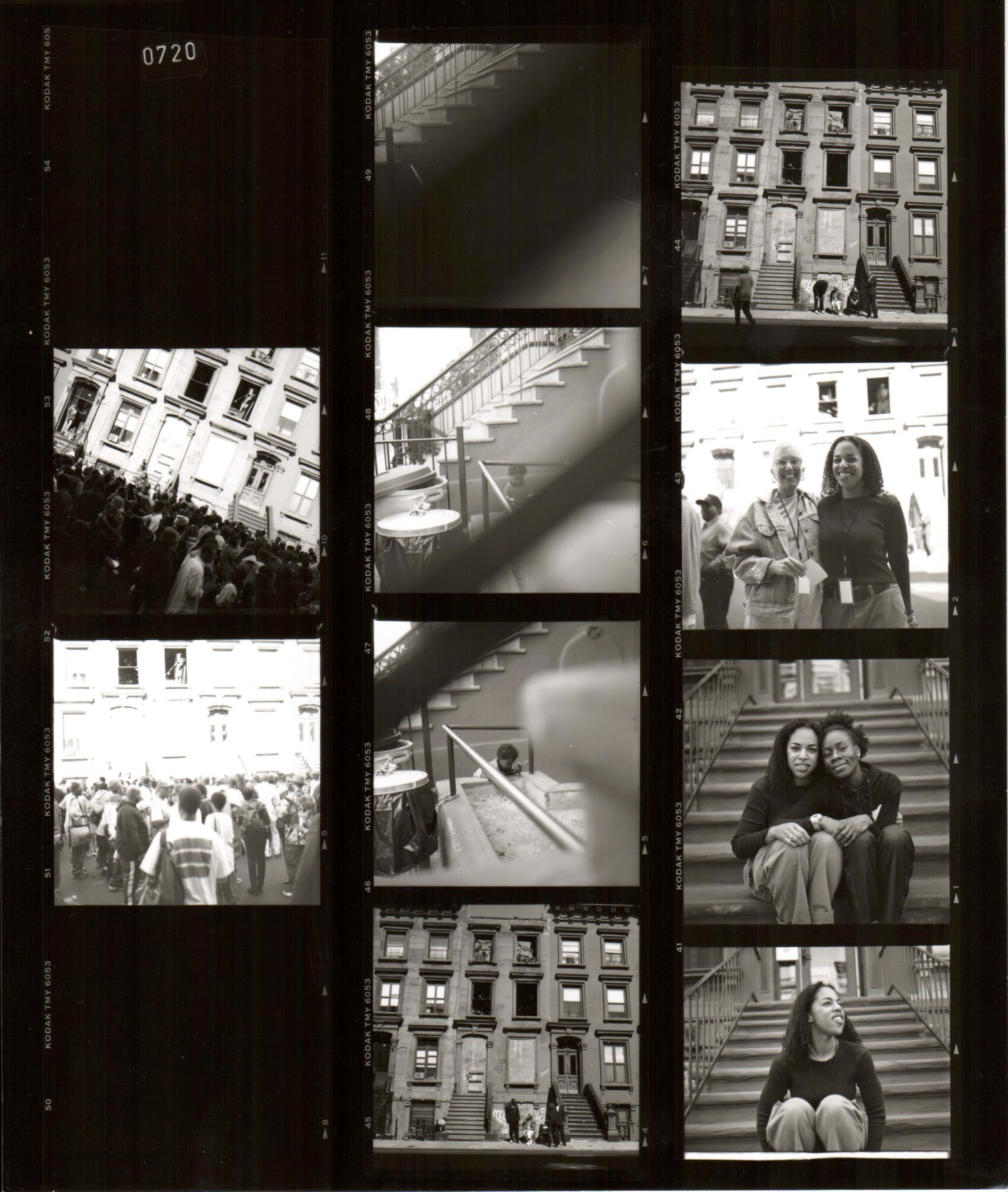
From the outset, XXL'southward comprehend event was labeled "A Great Twenty-four hours in Hip-Hop" as a manner to double-dip on the tribute-paying: Not only would Jazz Portrait become the love information technology and so richly deserved as a singular photo, simply so would A Great Twenty-four hours in Harlem, the 1994 Oscar-nominated, Quincy Jones-narrated documentary that caught Pam Rheingold'southward eye. Directed by Jean Bach, it captured the goings-on the Baronial 12 morning of Kane's 1958 photo shoot, rooted in home-picture show footage shot by famed bassist Milt Hinton, his married woman, Mona, and recollections from some of the musicians who participated. Similarly, hip-hop now had an indisputable appointment with destiny just over four decades later: Tuesday, Sept. 29, 1998.
Mr. Parks secured, Lesley and Biff'due south dual-engine publicity machines went into overdrive. They activated their straight relationships with indie and label publicists alike and their river-deep connections to a wide swath of hip-hop notables and industry blabbermouths to maximum effect. Equally weeks flew by, responses from artists and their reps rolled in just as rapidly. Amongst the early regrets: KRS-One was relocating out w. Water ice Cube had unbreakable film obligations; TV commitments had ensnared Queen Latifah and LL Absurd J. Public Enemy, of grade, would exist on a globe tour, and neither Nas nor Snoop could alter prior plans.
Still, confirmation calls kept No Screaming's phones abuzz: Busta Rhymes was in. So was Common and young man Chi-boondocks representers Crucial Disharmonize. Kool Herc. Ultramagnetic MCs. Scarface. Kurupt. Third Bass' MC Serch. Heather B. Mobb Deep. Eightball and MJG. The Roots. The Fugees. The Fresh Prince? No. DJ Jazzy Jeff? Yep. The original Jazzy Jeff? Hell, yes — plus the other Funky Four. The Cali cognoscenti would be in full issue: MC Eiht, Xzibit, Tha Alkaholiks, Mack x, DJ Muggs repping for Cypress Loma. Bay Surface area royalty E-twoscore, Del Tha Funkee Homosapien, Souls of Mischief and the Hieroglyphics massive. Slick Rick. Joseph "Run" Simmons and his big blood brother, Rush. Andre "Dr. Jeckyll" Harrell. Fab 5 Freddy. Blondie'southward Debbie Harry and Chris Stein. Luther Campbell. Pete Rock. Daddy-O. De La Soul. Wu-Tang Association's U-God and Inspectah Deck. Fat Joe. A+. Ed O.G. Canibus. Outkast and Jay-Z had albums dropping on the 29th — Aquemini and Vol. two … Difficult Knock Life, respectively — so they'd exist no-shows. Conversely, A Tribe Called Quest, Brand Nubian and Black Star, releasing The Love Movement, Foundation and Mos Def & Talib Kweli Are Black Star LPs that day, affirmed they'd make it, every bit would Schoolly D. Angie B. Kool Moe Dee. Rakim.
Not surprisingly, Les and Biff proved to be all that and more equally project managers. They handled every detail of "Groovy Day," from reaching out to major print, Telly and entertainment media outlets and handling the beat of local printing requests to obtaining the necessary city permits and renting a comfy on-site trailer for Mr. Parks, whose involvement had rendered XXL'south cover shoot about mandatory for any rapper worth their salt. Dennis and Jonathan were walking on sunshine next to the guys in sales. Over on our side, the entire edit staff fielded increased calls from colleagues and friends wondering if there was guest-list-onlooker beloved to be doled out. Not much, no. Only nosotros weren't pressed. We were all flying high.
I crashed tardily one morning afterward a fuming Lesley called the role, practically spitting fire, angrier than I'd ever heard her.
"You lot are non going to believe this!" she seethed. "You lot're at your desk, right? Sitting down?"
Oh, lord, I think. Is the church trying to jack us for more than coin? Not yet. This evolution was a slight more ungodly.
"Danyel is telling publicists at the labels that whatever of their artists who bear witness up for 'Great Twenty-four hour period in Hip-Hop' will be banned from Vibe."
Huh? I bolted up in my chair. "No, she's not, Lesley. Tell me you're joking."
"I'1000 not," she muttered testily. "I wish I was. Tin you lot believe it?"
Just similar that, my instinct-led leap the year earlier to curlicue the die at XXL had been validated.
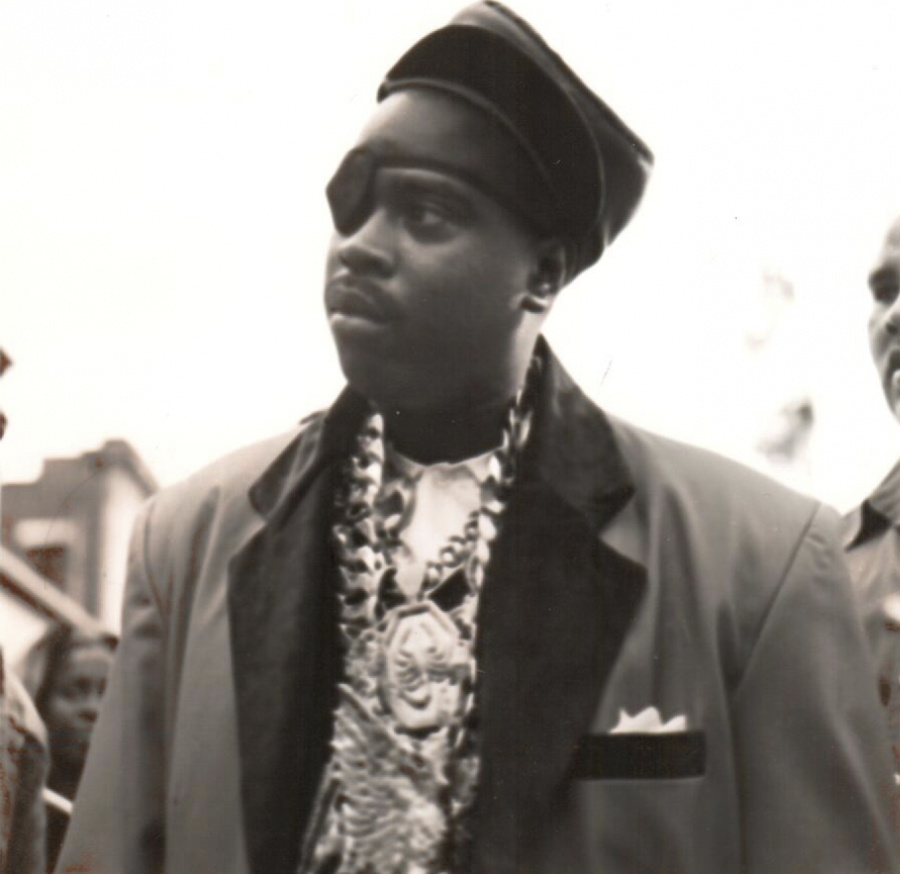
Vibe'due south former editor-in-chief, Alan Light, had lured me away from Rap Pages intent on making his volume more like our irreverent, edgy mix of hip-hop music and culture reporting, commentary and what not. Upon Danyel Smith'south date to the height job after her stint as music editor, she summoned me to lunch at ABC Rug and Domicile, where she explained that, equally far as Vibe'southward music coverage was concerned, the plan on her lookout man was "to follow the pop charts." The words echoed in my ears similar church bells. Follow the pop charts? I sure as hell didn't go out Los Angeles' loving embrace or haul my meaning-with-twins behind from the big chair at Rap Pages to rail pop audiences' fickle whims. The masses are asses, recall? Our chat fabricated it clear the Vibe Danyel planned to create wasn't one I'd enjoy or thrive in. That was when I, as Large Professor and then succinctly stated, started looking at the forepart door.
But this time, shock instantly morphed into rage. She'd already brought Lesley some industrial-strength hurt: Instead of being happy for the huge feather "Great Day" would put in the cap of her close friend's young business, Danyel stopped speaking to Les after No Screaming partnered with XXL. Plus, non just was this competition at its ugliest and most twisted, it was ineffectual. 'Cause everybody – everybody – recognized that Mr. Parks' participation, his willingness to elevate this photo into his glorious portfolio, gave our shoot undeniable historic significance. It transcended mag rivalry. The fact that she'd attempt to cow a single soul from taking part was every bit mystifying as it was infuriating.
Needless to say, I was beyond infuriated.
"I'll call you correct back," I hissed, slamming down the receiver earlier lifting it into a tight grip while furiously dialing the number of Vibe'south principal executive officer, Keith Clinkscales. He had forgiven me long ago for persuading Blackspot to exit their ranks with me.
"Hey, lady! What's going on?" Keith asked before I could utter a discussion, probably forewarned by his secretary that something was off in my ordinarily-friendly tone. "Everything okay?"
"Non at the moment, no," I replied flatly. "A very reputable source just told u.s. that Vibe'south editor-in-chief"— avoiding the taste of her name in my mouth, I was so disgusted – "is threatening record company publicists, warning them that if their artists pose for XXL's 'Great Mean solar day in Hip-Hop' cover, the one beingness taken past Gordon Parks, they'll never be featured in your magazine over again. You wouldn't know anything about this, would you?"
"Expect … what?" He sounded truly taken ashamed.
I began again, teasing Lesley'south claims apart slowly. Keith listened with Chore's patience, saying zip, but I suspected he'd be gobsmacked. One, this proud FAMU graduate would forfeit a thumb earlier intentionally blocking a solitary blackness person – let lonely dozens of black cultural pioneers – from existence captured for posterity'south annals past a behemothic like Parks. 2, blind gamblers in the night could meet how remote odds were that any shrewd media executive would greenlight then chickenshit a tactic. Word would spread like wildfire, and information technology'd be universally perceived as desperate, non a power play. Keith knew that. His mag's editrix apparently did non.
"Awww, the poor thing'southward choking on envy right at present, isn't she?" I spat, consciously watching my volume, as others' work spaces were close past. "Is your editor jealous that our moving-picture show'south going to be hanging on museum walls in 100 years?" My taunts turned into snarls. "Yous tell that bitch that if she keeps trippin', we'll throw a goddamn press conference on the steps of Vibe'south building and phone call her raggedy ass out by name for existence the sore fucking loser that she is! Please tell her that, hear?!"
"Calm downwards," Keith finally interjected. "Let me discover out what'due south going on. Stay by your phone."
Click.
Most twenty minutes later, it rang.
"Hi?" It was Keith.
"Everything'due south fine," he said.
"It is?"
"It is."
"You sure?"
"I promise."
A deep sigh. "Thank you, Keith. Thanks. I can't tell you how much I appreciate that."
He chuckled. "I know you practise. Good luck with your thing. And Sheena?"
"Yep?"
"Congratulations."
Click.
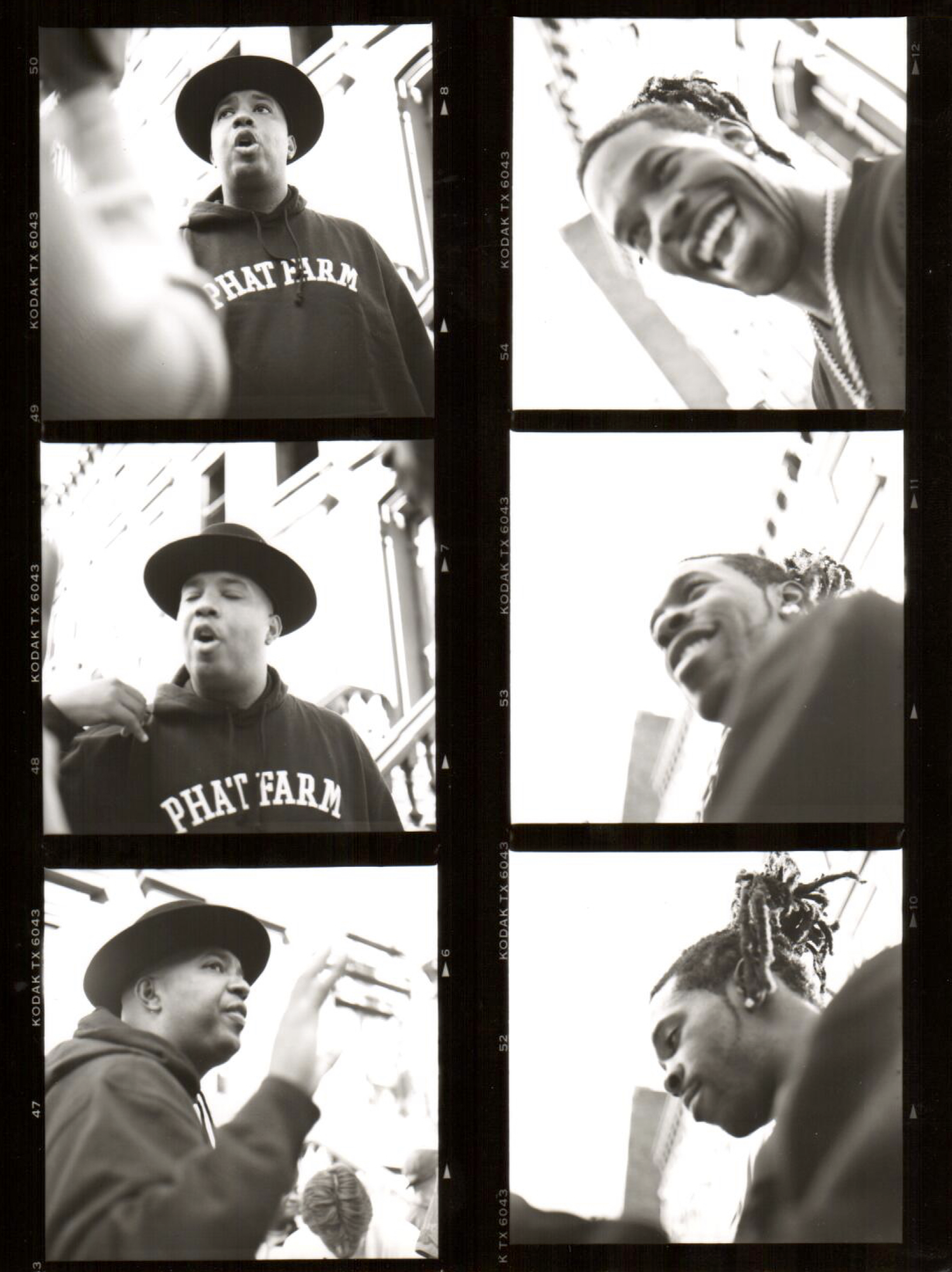
Confirmations continued to fly into No Screaming: Grandmaster Flash and the Furious 5. Marley Marl. UTFO. Nikki D. Saafir. Overnice & Shine. Jermaine Dupri. D-Overnice. MC Shan. Chuck Chillout. Naughty By Nature. Freddie Foxxx. The Jungle Brothers. The Beatnuts. Queen Pen. Poor Righteous Teachers. Channel Alive. Shyheim. DJ Hollywood. Kris Kross. Paula Perry. Awesome 2's Special K and Teddy Tedd. Black Moon. The Lox. Jane Blaze. Shaq. Kid Capri.
One early on August afternoon, about a month and a one-half ahead of the big solar day, Lesley marched into our weekly-update working lunch with a magazine tightly coiled into the cheat of her arm and a beaming Biff in pace behind her. The pair said nothing, stopped above where I sabbatum and peered downwardly at my curious, upturned face. Lesley opened the 'zine; it was Vibe's September "Juice" effect, Will Smith's handsome mug atop it bearing an inquisitive expression. She flipped through its colorful, 300-plus pages before locating a 2-page layout, then, with a dramatic flourish, dropped the open up spread onto the table in front of me.
Vibe had gathered the rappers who'd participated in two ensemble recordings: 1988'southward "Self Destruction" and 1990'south "We're All in the Aforementioned Gang," a list that included Chuck D, Digital Cloak-and-dagger's Daze Thou, Big Daddy Kane, MC Lyte and MC Hammer. The group photo, visually styled subsequently Kane's famous photograph, was taken on Morehouse College's campus in Atlanta.
Its title? "A Great Day in Hip-Hop."
I looked upward at Biff and Lesley, our respective side-eyes locking.
The three of usa burst into laughter.

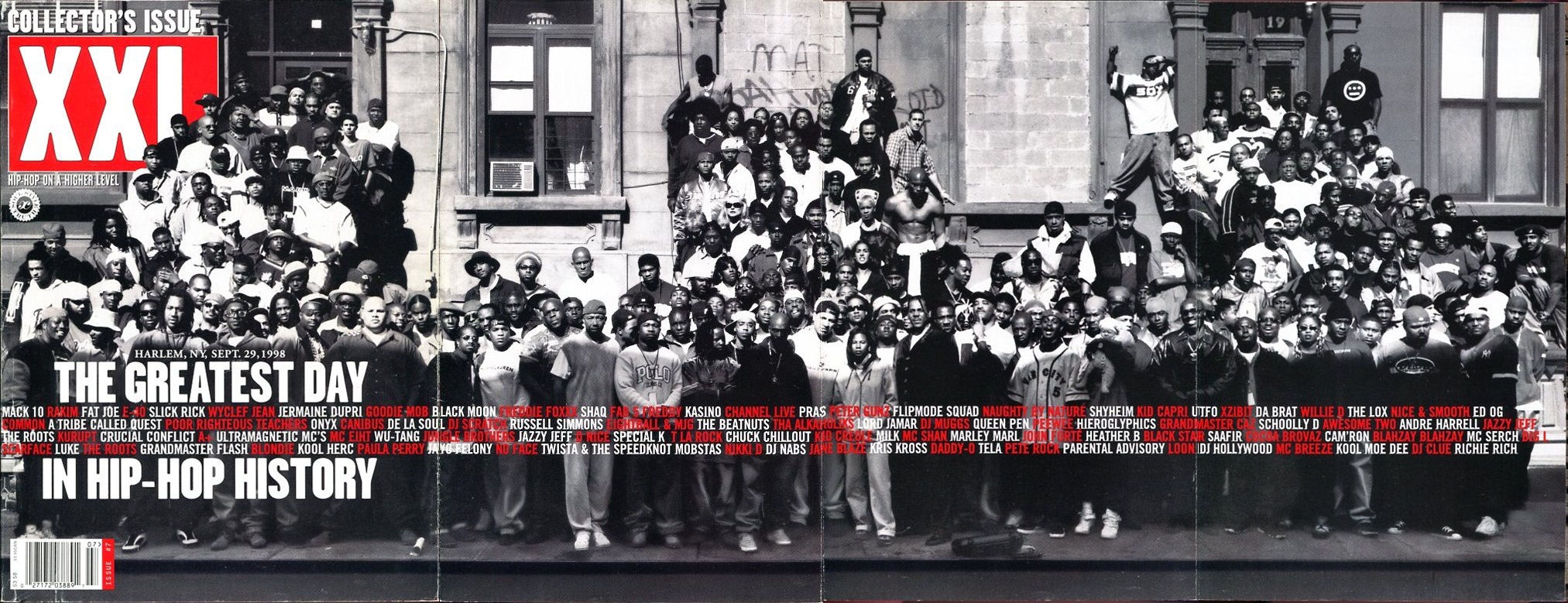
XXL magazine issue #seven published at the time past Harris Publications, Inc. (XXL magazine is Copyright © Townsquare Media, Inc.)
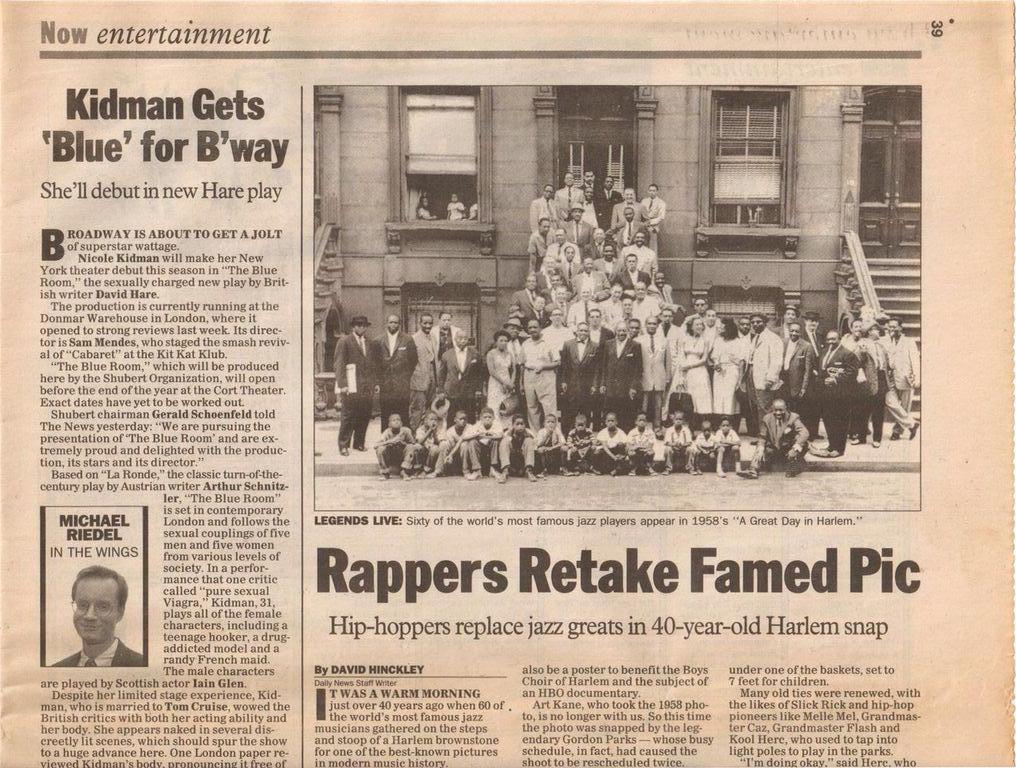
Newspaper clipping extract New York Daily News. (Copyright © New York Daily News)

The events of that late September afternoon 20 years agone were lovingly revisited past Harry Allen and Miles Marshall Lewis for XXL in dual cover pieces for its Dec. 1998 issue and recalled since past Michael Gonzales in articles for Red Bull Music University and Ambrosia for Heads. Nelson George'south 1999 documentary short, A Great 24-hour interval in Hip-Hop, captured the proceedings superbly, albeit too briefly. Be assured, as anyone who attended or participated will attest, it was equally extraordinary as y'all can imagine.
On Aug. 3, 1999, less than a year after XXL's "A Great Solar day in Hip-Hop," Lesley Pitts died of a pulmonary aneurysm. She was 33.
On Aug. 19, 1999, Los Angeles lensman Arnold Turner gathered dozens of California hip-hop heavyweights under a throughway overpass for "A Twenty-four hour period in the West." No picture from that shoot was always released.
In 2003, John Grooms, with Kemi Dennings, shot "A Great Day in Atlanta," memorializing the city's rap icons and scenemakers at Clark Atlanta University. Two years later, as part of filming for its My Block serial, MTV did the same at the Gilbert Firm.
Hundreds of musicians and creatives in other cities, national and international, take staged their own "Keen Day" homage photo shoots. In June of this year, lensman Kwaku Alston shot a mix of talented black actors, directors and producers for Netflix's "A Bully Day in Hollywood" at the famous Harlem accost.
Gordon Parks died on March vii, 2006 of liver cancer. He was 93.
Source: https://cover.respect-mag.com/game-changer/
Belum ada Komentar untuk "Young Harlem on His Shit Again"
Posting Komentar